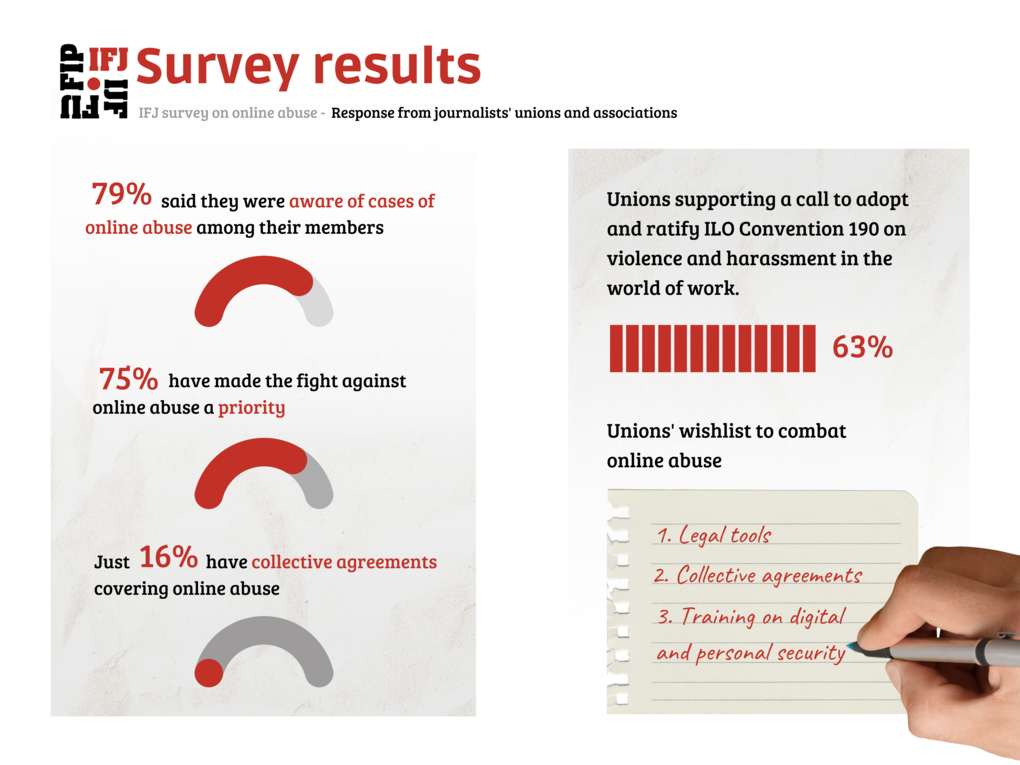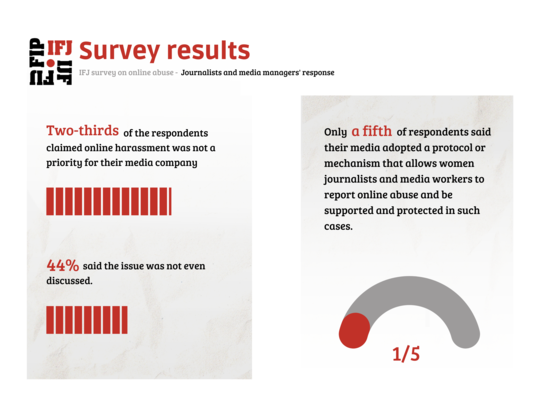The IFJ has urged unions and media to adopt strict protocols and strong collective agreements to combat online abuse.
On the eve of International Women’s Day, the IFJ launched the results of two surveys conducted in early 2022 to assess the work of trade unions and media organizations in tackling online abuse.
The IFJ had previously exposed the scale of online abuse suffered by women journalists with almost two-thirds having been subjected to online harassment. Only half of the women targeted online reported the attacks to their media management, union or the police, and in two-thirds of the cases nothing was done.
Now the latest survey collecting responses from 56 members of the IFJ has revealed:
- 79% of unions and associations said they were aware of cases of online abuse among their members.
- Just 16% have collective agreements covering online abuse
- 75% of unions and associations have made online abuse a priority issue
- 63% of unions backed a call to adopt and ratify ILO Convention 190 on violence and harassment in the world of work
Unions and associations of journalists said they supported their members through legal assistance, public statements as well as training on digital safety and guidelines to prevent online abuse.
Specific union measures to fight online violence include the adoption of protection codes, the setting up of national committees for the safety of journalists, mapping of cases, the development of an index of physical security of members and platforms to report attacks or free legal help lines.
When looking at the initiatives launched by media organisations to address online abuse, results of the second survey show a lack of action. One hundred and sixty one journalists, media professionals and media managers representing 37 countries across the world were questioned.
The findings show that :
- Two-thirds of the respondents claimed online harassment was not a priority for their media company, and 44% said the issue was not even discussed.
- Only a fifth of respondents said their media adopted a protocol or mechanism that allows women journalists and media workers to report online abuse and be supported and protected in such cases.
The support granted by media organisations, when existent, consisted mainly of legal assistance, public support , access to safe spaces and trained support staff and counseling.
IFJ Gender Council chair Maria Angeles Samperio said: “Too many women journalists, in particular freelancers, are affected by online abuse and leave social media to avoid further harassment. The surveys show that plenty of work needs to be done by media organisations to provide safer newsrooms and concrete protocols to eradicate the phenomenon. It is time to introduce clear mechanisms in the media to show a zero tolerance against media abuse”.
IFJ General Secretary Anthony Bellanger said: “Safety of journalists is crucial to report the truth and fulfill the public’s right to know. Yet, women journalists continue to face deep abuse online with a clear impact on media pluralism and diversity. As media professionals, we cannot simply sit and watch. The lack of collective agreements provisions addressing online abuse is a real concern. Our surveys show how unions and associations of journalists are ready to act but we need media organisations on board and we must act together to eradicate online abuse in the name of media freedom".
The IFJ has adopted guidelines to support media and unions in their fight against online abuse. The federation urges media to launch internal audits among their staff to evaluate the scale of online abuse.

